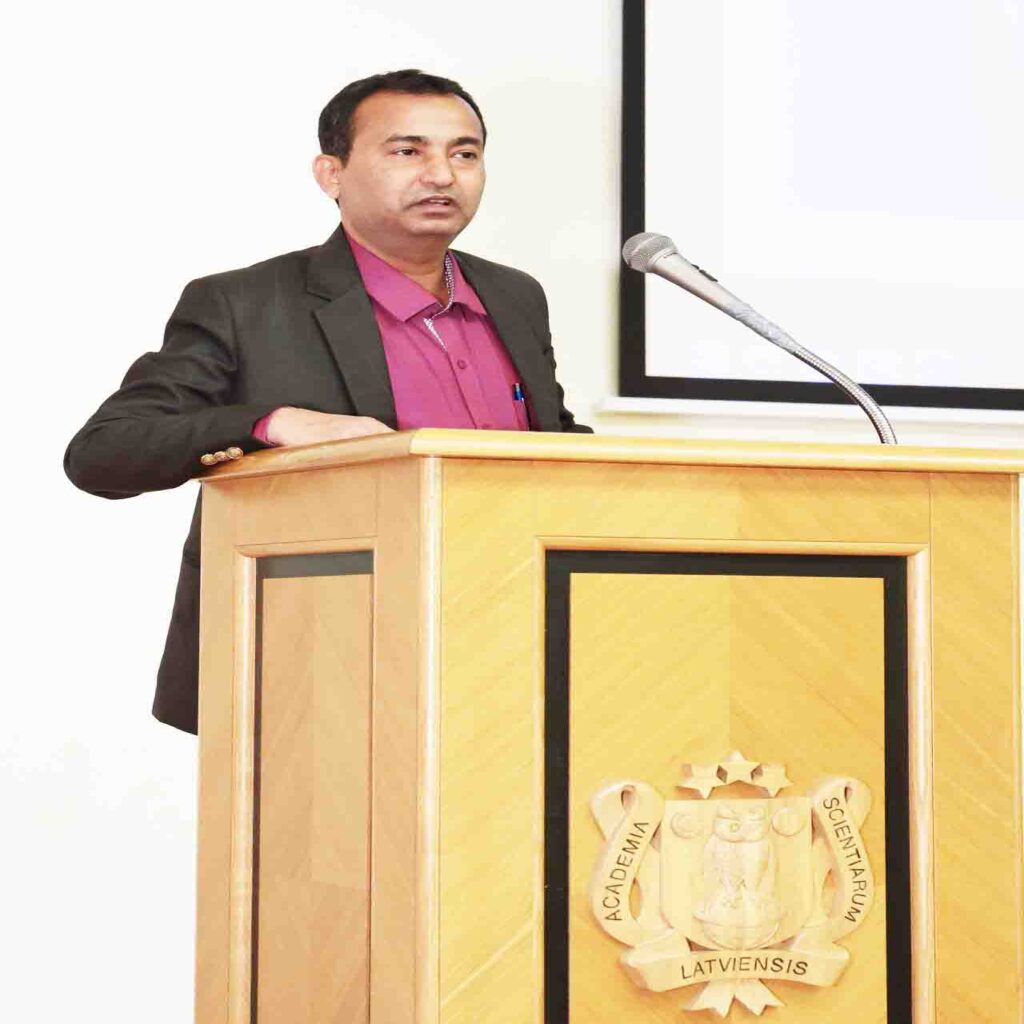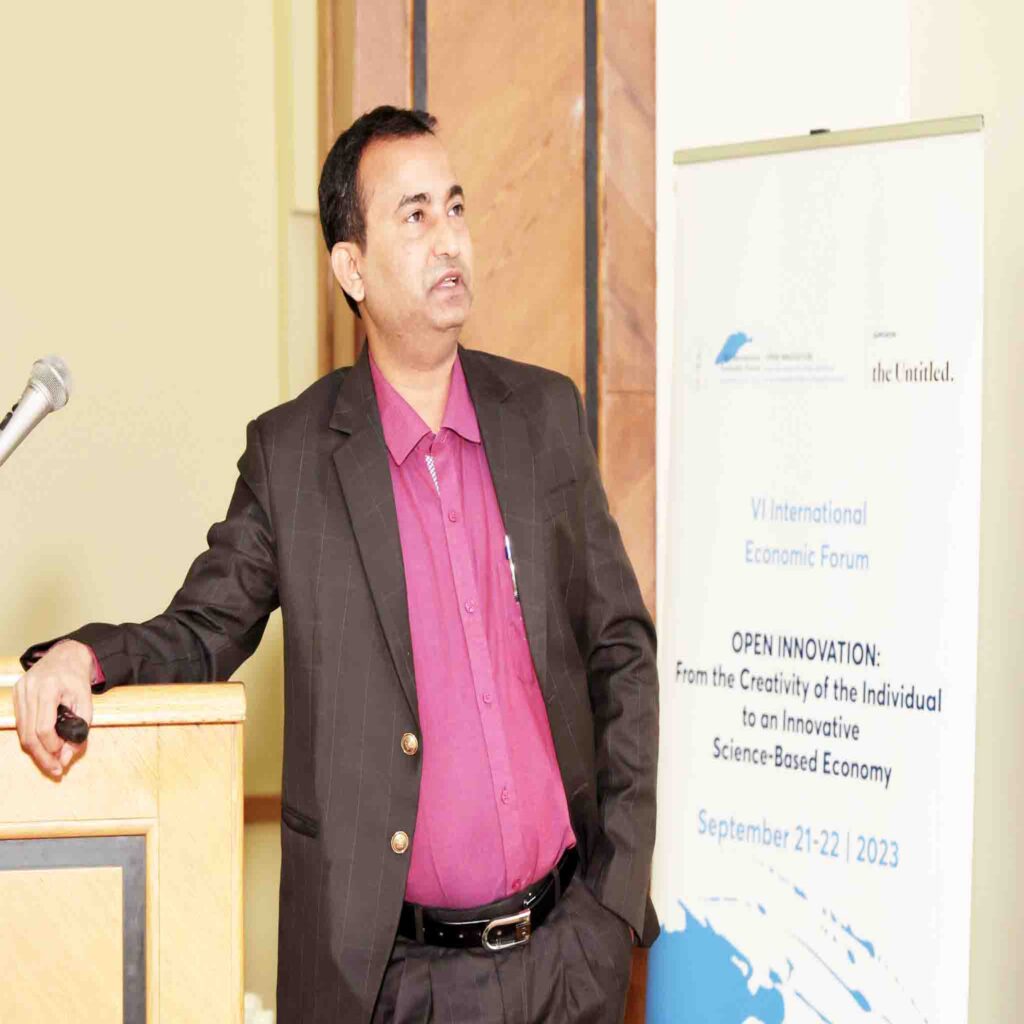The changing face of global innovation has brought enormous opportunities & new frontiers of progress that embrace external cooperation in a complex world. Inbound open innovation, and Outbound open innovation are the essential features that lead to growth & transformation. Innovation is a corporate priority to inspire the academic community to investigate the issue of why companies from emerging economies have limited open innovation strategies, when they need to draw on external partners as to overcome the institutional, resource and capability constraints they are subject to. We are living in an era of Information overload & where everything that we do & practice will have a strong bearing on the future generations & we must not be blind to embrace open innovations that foster & unleash exciting opportunities.

As I prepare to present the most important topic in recent times “Open Innovations: New Frontiers of Government’s Public Policy” at the historic VI International Economic Forum’s most aptly theme “OPEN INNOVATION: from the Creativity of the Individual to an Innovative Science-Based Economy” in Riga, Latvia organised by Institute of Economics of the Latvian Academy of Sciences I say with all humility that, one must Question the government of the day that do not allow open innovations of public policy mechanism.
Truth Cannot Be supressed By A Bloated Response That Ignores Every parameters of Open Innovations. We have to accept the fact that more open the government’s public policy mechanisms are, the more vibrant the democratic values will be. In the words of Maria Ressa, the American journalist “Without facts you cannot have the truth, without truth you cannot have trust and without any of these things you cannot have a functioning democracy”
We live in a more complex, interrelated world—and we have entered an era of innovation by ecosystem. Catalyzing innovation in the era of ecosystems calls for new thinking to match the new reality. Government public policy mechanism & it’s open innovations in various key reforms are fundamentally important to accelerate important innovation ecosystems.
In April 2023, we heard that $1.4 billion was invested in 11 large-scale research initiatives at postsecondary institutions via the Canada First Research Excellence Fund (CFREF). These 11 initiatives will encourage partnerships throughout Canada’s academic, private and not-for-profit sectors and beyond for research that provides crucial economic and social benefits for Canada’s inhabitants.

Whether it’s preventing and treating heart and brain disease, reducing carbon emissions in communities or making discoveries concerning AI, advanced computing and robotics, the Government Public policy mechanism must encourage the vital role of scientists and science, research and innovation in society.
Connected Participation
Government transformation is hard to pull off in a context of fiscal challenges, public mistrust, and workforce fatigue
Many public authorities have focused on building participative components into public consultation mechanisms. Participation through Consultation
A large number of governments around the world offer consultative mechanisms that allow citizens and organized interests to have input into new legislative proposals. Most also have some form of online petition process through which citizens can call on governments to take action in specific areas of policy. Such forms of consultation and petitioning have expanded dramatically but do not involve democratic deliberation as such. While they offer citizens the chance to connect to public authorities and to place or raise a certain issue on the policy agenda, they do not provide democratically representative participation and decision making in the same way as citizen assemblies and panels.
In South Korea, authorities have created online petition platforms that facilitate iterative discussion between citizens as well as between them and policymakers.
In Georgia, local authorities have created participative bodies that involve citizens and deliberation within formal municipal processes, including by selecting “civil advisors” and through citizen monitoring of officials’ performance.
In Nigeria, some authorities have pioneered a platform for citizens to monitor and give their opinions on local government projects as well as to engage in open debate on these with each other and representatives of local planning authorities.
In South Korea, a randomly selected assembly on nuclear policy led to a formal direct-democratic vote that connected the process to the wider policy cycle and determined a key change in policy directly against the government’s preference.
An innovation isn’t successful unless it’s implemented & successfully delivered to the public at large. we know that today’s science is tomorrow’s economy. Collaboration in science, technology and innovation, Research of today, the innovation of tomorrow should be the guiding principles of new frontiers of open innovations in governments.
Recent initiatives for fostering citizen participation in Europe, Australia, and Canada have attracted much attention, especially selection-based “mini-publics”—of which one form, citizens’ assemblies, has become increasingly popular.
OPEN TO THE PUBLIC.
To strengthen policymaking, the government has also launched initiatives to promote the use of open data. With citizens’ frustration with and alienation from political elites becoming more widespread and severe around the world, as manifest in a rising number of significant anti-government protests globally, the need for innovative channels of citizen participation has become more pressing. Despite the powerful global dynamics of democratic regression, many positive forms of such participation have taken shape in the last several years. Indeed, many analysts detect that a new ethos of citizen participation is defining efforts to push back against democratic decay.
Catalyzing modern innovation
Open innovation has become a buzzword in recent years, and it’s not hard to see why. This approach to innovation has proven to be highly effective, not just for businesses but also for governments. In this article, we’ll explore the benefits of open innovation for governments and why it’s a valuable strategy to consider. Business does not exist in a vacuum — government policy impacts the structure of the market from which competitive advantage derives. In turn, business plays a role in the formulation of government policy. This interdependence is particularly important in innovative industries, where new business models often conflict with existing regulatory frameworks and entrenched market and political power. Understanding the interplay of policy and innovation is essential for entrepreneurs, investors, and incumbent firms, both small and large, early stage or mature.
What is Open Innovation?
Open innovation is a collaborative approach to problem-solving. It involves sharing ideas and knowledge with individuals, organizations, and communities beyond an entity’s traditional boundaries. Open innovation can involve working with customers, suppliers, competitors, researchers, and other stakeholders.
Benefits of Open Innovation for Government’s Public Policy.
- Improved Access to Expertise and Resources
Open innovation enables governments to tap into a wide range of expertise, ideas, and resources beyond their internal capabilities. By collaborating with external partners, governments can access the latest research, technology, and knowledge to solve complex problems.
- Increased Efficiency and Effectiveness
Open innovation can help governments to streamline their operations and make more effective decisions. By involving a broader range of stakeholders, governments can gain a more comprehensive understanding of the issues they face, leading to more informed and effective solutions.
- Cost Savings
By tapping into external expertise and resources, governments can save research and development costs and avoid expensive mistakes. Open innovation can also help identify more efficient ways to deliver public services, resulting in cost savings for the government and taxpayers.
- Enhanced Public Engagement and Transparency
Open innovation can help to build trust and increase public engagement by involving citizens in decision-making processes. By sharing information and involving the public in policy-making, governments can demonstrate transparency and accountability, ultimately building stronger relationships with citizens.
5. Increased Innovation and Creativity
Open innovation fosters a culture of creativity and innovation by bringing together diverse perspectives and ideas. This approach can help governments to develop innovative solutions to complex problems and promote the development of new technologies and services.
Concluding Observations.
Open innovation offers many benefits for governments, from improved access to expertise and resources to increased efficiency, cost savings, and enhanced public engagement. By embracing open innovation, governments can better address complex challenges, deliver more effective public services, and build stronger relationships with citizens.
About Dr Satya Brahma
Dr Satya Brahma is India’s most respected & distinguished journalist & Chairman & Editor-In-Chief of Network 7 Media Group. Known for championing the cause of Citizen’s rights & free speech Mr Brahma has been at the forefront of United Nation’s Peace programs. Mr. Satya Brahma is also the author of Vision India – Truth VS Hype. Satya is an industry expert & one of India’s top journalists. Satya holds a Master’s degree in Political science with First Class First Gold Medallist from Berhampur University & Master’s degree in Journalism & Mass Communications. Dr Satya Brahma is a PHD from the reputed Dr Abdul Kallam Research Institute in India in Journalism & Mass Communication. Dr Satya Brahma founded India’s flagship annual event, India Leadership Conclave, an open innovation forum where corporate world meet with policy makers, rebel leaders, social entrepreneurs & politicians to debate & discuss the contemporary issues.
Satya Brahma believes that only strong opinions with definitive actions can influence the policy makers of the society & hence is committed to bring & expose the hidden stories that need global audience.

